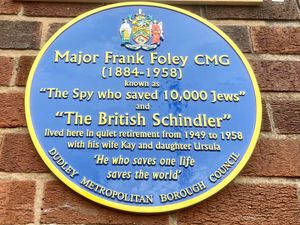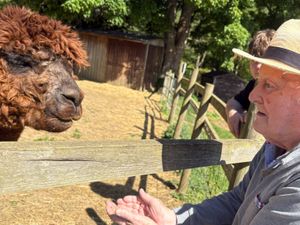Black Country war hero who saved thousands of Jews from the Nazis honoured with blue plaque
A Black Country war hero who saved thousands of Jews from Nazi concentration camps during the Second World War has been honoured with a blue plaque.

Major Frank Foley, who lived in Stourbridge before his death, used his role as a passport controller at the British Embassy to save Jews from the concentration camps.
He used skills picked up in the secret service to obtain false papers, passports and visas. He entered the camps and presented travel visas to the Nazi authorities.
It is believed the actions of the wartime hero saved over 10,000 Jews from the gas chambers, with his efforts only coming to light 40 years after his death.
Now, four years after Maj Foley was honoured with a statue unveiled by Prince William, he has been remembered once more for his heroism through a blue plaque.
It has been unveiled at a private property in Eveson Road, Stourbridge, where the war hero – nicknamed the "British Schindler" – lived with his family until his death in 1958.
Councillor Sue Greenaway, the Mayor of Dudley who unveiled the plaque, said: "Major Foley has become synonymous with bravery and going above and beyond and it is only right we continue to honour him. A Blue Plaque is a very high honour and will go some way to reminding local people of the enormous bravery he showed and risks he took during the build up to the second World War. It was a real honour and a privilege to be able to unveil this plaque today.
"Today the house stands on a quiet residential street. The owners, Jon and Sarah Tanner, welcomed around 100 people on their driveway for the grand unveiling."
Jon Tanner, owner of the house, added: "I suppose it was quite surreal to have a crowd outside our home but nice to see so many people coming to see the unveiling of a plaque for such an important hero. The plaque will certainly remind us of what Major Foley did every time we come home!"
Maj Foley lived in the property in Eveson Road with his wife Kay and daughter Ursula, from 1949 until his death in 1958.





